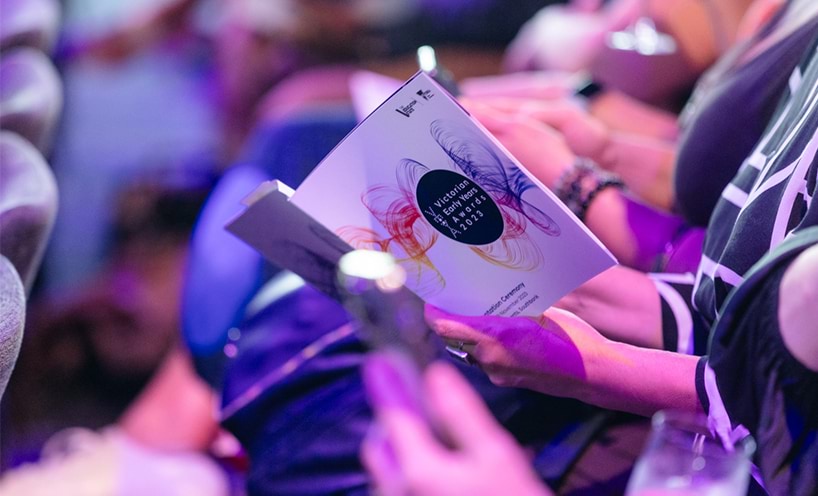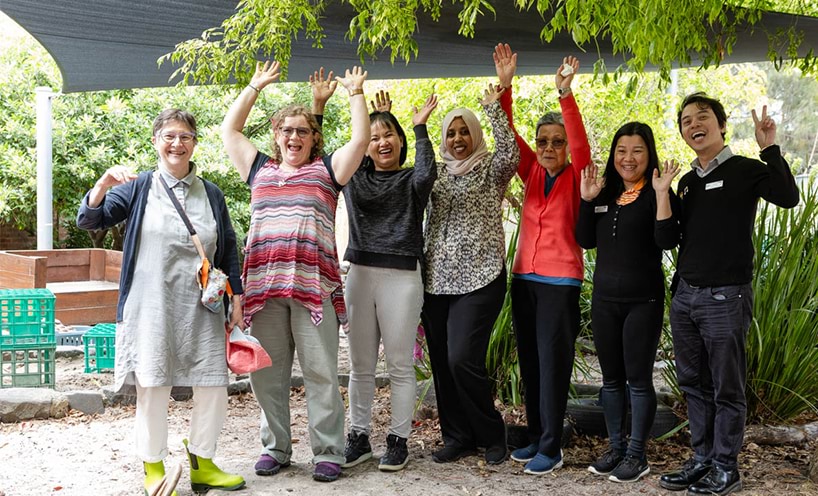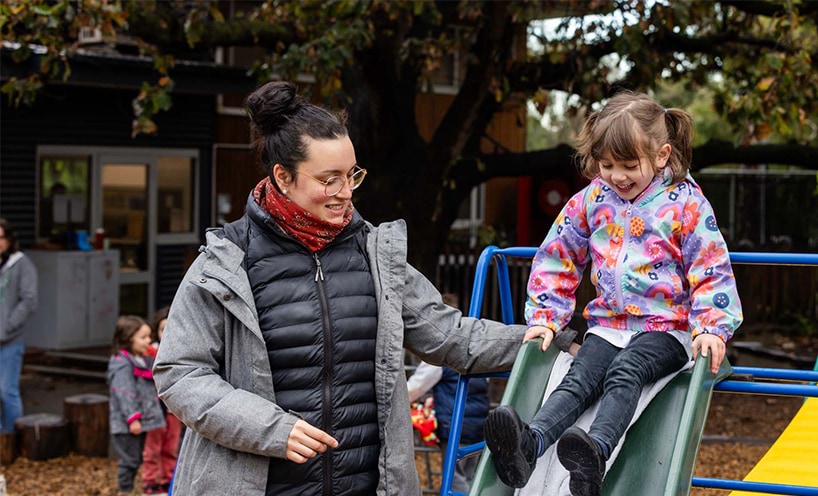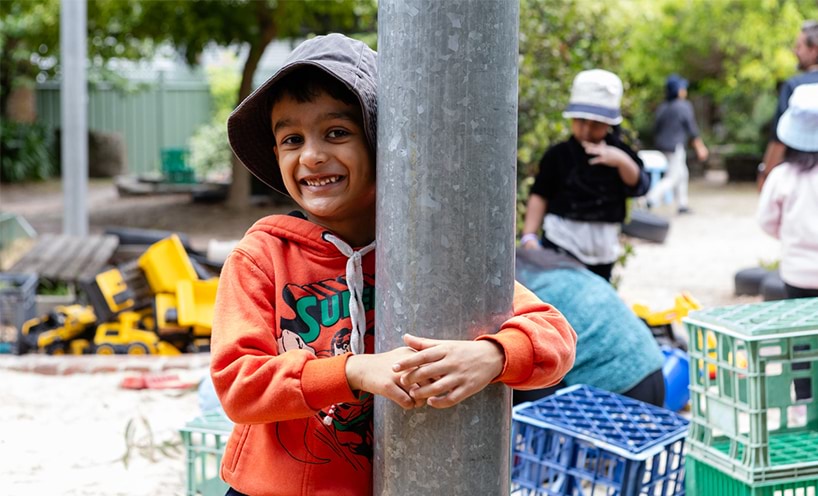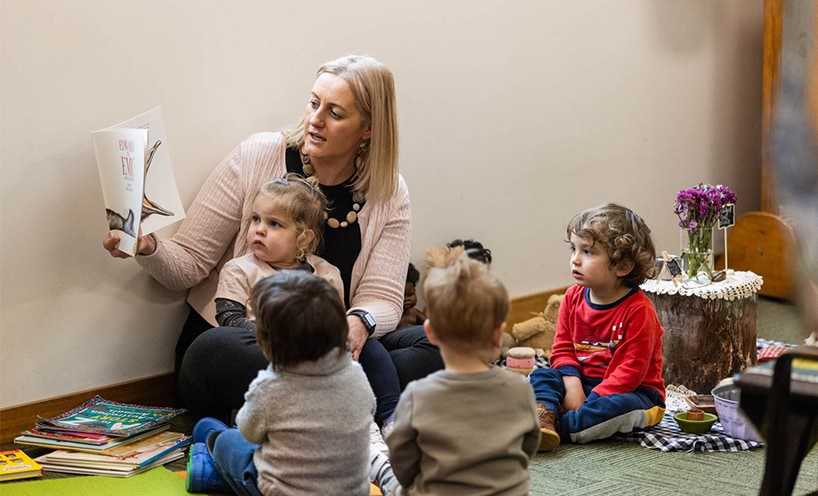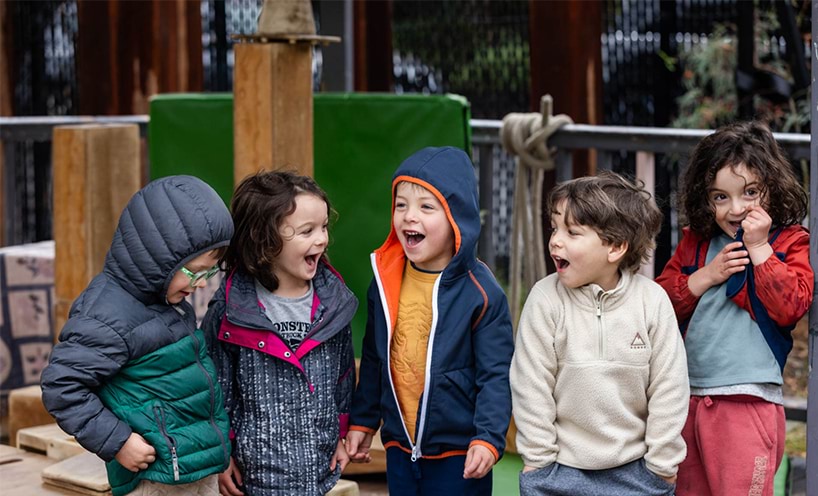- Published by:
- Department of Education
- Date:
- 1 May 2024
The Early Childhood Update e-newsletter is sent to early childhood teachers and workers, but is open to anyone interested in best practice in early years education and evidence-based teaching approaches. Subscribe here to receive the e-newsletter(opens in a new window).
Supporting quality practice and building careers that last the distance
Opportunities for new teachers and educators to advance their careers and deepen their practice.
Dear early childhood education and care services
The days have turned shorter and chillier, and this is also the time of year when many services will be in the thick of taking enrolments, with local families busily getting their plans in place for 2025. If you haven’t already, it’s a good moment to take a look at the communications resources you can use to help communities better understand the ways kindergarten supports children, and to showcase what programs will look like in your service next year.
In looking ahead to your enrolments for 2025, this can also give services a valuable chance to plan for the introduction of Pre-Prep, and this month’s edition of Early Childhood Update includes some tips for how to use this 2025 enrolment data to plan for 2026 delivery.
On Tuesday 7 May 2024, the Victorian Government will hand down its State Budget. As part of this, the Minister for Children will announce the budget allocations for 2024–25. As usual, please look out for communications from the department for details about budget outcomes for our sector.
These reforms have seen our workforce grow, adapt and continue to strive for quality and excellence, with an impressive focus on what matters most. Across the board we’re seeing strong uptake of our professional learning, mentoring and coaching programs. This is evidence of the sector’s deep commitment to practice quality during this time of reform.
In this month’s edition, you’ll see some great skill-development opportunities, especially for beginning teachers and educators, to help advance your career and deepen your practice. Teachers, educators and service leaders have been providing valuable feedback on how we can further develop our professional practice supports through our proposed approach to Teaching Excellence. Thanks to all who have contributed feedback so far through your network meetings. If you have any questions, please reach out to your regional network Kindergarten Improvement Adviser.
Finally, we’re announcing the opening of nominations for this year’s Victorian Early Years Awards. Anyone in the sector can nominate for these awards, and you can put a colleague, your service or yourself forward. With winners of these awards receiving substantial grants, this is one of those situations where tooting your own horn is not only appropriate but very much encouraged!
There’s never been a better time to recognise and celebrate the great work happening every day in the early childhood sector so when you’re reflecting on the positive impact you’re seeing, we want to hear about it, too.
Yours sincerely
Bronwen FitzGerald
Deputy Secretary
Early Childhood Education
Victorian Early Years Awards 2024 nominations open
Nominate the outstanding professionals, teams and services making a difference to their communities by 13 June 2024.
This message may contain images and the name of Aboriginal persons who have passed.
The Victorian Early Years Awards (VEYA) are back to celebrate the professionals, teams and organisations improving the health, learning, development and wellbeing of Victorian children and their families.
You can nominate yourself, a colleague or an early childhood leader, service or organisation demonstrating leadership, outstanding achievement or exceptional dedication.
Winners of each category will receive a grant of $15,000 to further develop their initiatives (and share the learnings of their approaches) or to support their professional development.
The finalists and winners in each category are also eligible to win the prestigious Minister’s Award, selected by the Minister for Children, with the winner receiving a $15,000 grant.
With the year in full swing, there’s never been a better time to recognise and celebrate the great work happening every day in the early childhood sector.
Nominations close Thursday 13 June 2024, so start looking for those early childhood champions who deserve to have their accomplishments put up in bright lights!
Recognising dedication and skill
The 9 VEYA categories focus on the following themes:
- improving engagement in early learning
- supporting parents and carers in their role as their child’s first teacher
- building collaborative community partnerships
- improving child health and wellbeing
- supporting continuity of early learning through successful transitions
- recognising an early childhood teacher who demonstrates exemplary practice in early childhood education
- significant improvement in learning and teaching practices
- recognising the importance of Aboriginal inclusion and perspectives in ensuring all services are accessible to Koorie children and families
- recognising early childhood educators who make a vital contribution to early childhood services and children’s learning outcomes.
How to nominate
Anyone can nominate someone for a VEYA, and you can even nominate yourself!
Early childhood teachers, educators, educational leaders, early childhood services, organisations or primary schools making a difference to the lives of children aged from birth to 8 are all eligible.
To nominate, refer to Victorian Early Years Awards(opens in a new window).
Application support
If you want to know how to make your VEYA application stand out from the crowd, you can head along to a free webinar on Wednesday 15 May 2024.
Event details
Date: Wednesday 15 May 2024
Time: 4:15 pm to 5:15 pm
Platform: online
Cost: free.
To register, visit free webinar.
If you can’t get along to the webinar but would like feedback on your application, send a copy, along with your application ID number, to the Victorian Early Years Awards team by email: early.years.awards@education.vic.gov.au(opens in a new window)
Find out more
For more information, refer to Victorian Early Years Awards.
To read about our previous finalists and winners, refer to Victorian Early Years Awards winners.
For further enquiries, contact Vicki Elliott, senior project officer, Workforce Retention and Recognition team:
- phone: (03) 4113 7467
- email: early.years.awards@education.vic.gov.au(opens in a new window)
Supports for early career early childhood professionals
Get your teaching career off to a great start with these learning programs.
Starting a new job can be a steep learning curve, which is why we offer a range of professional development programs for early childhood educators and teachers to help build strong and long-lasting careers.
If you’re at the start of your journey as an early childhood professional, check out the great opportunities available to help kickstart your career.
Beginning Teacher Conferences
Our Beginning Teacher Conferences give you an opportunity to strengthen your professional practice and build professional networks with peers.
They’re tailored specifically for those in their first 6 to 12 months of teaching, and for teachers working in funded kindergarten program services who are expected to graduate in the next 12 months.
Upcoming conferences will feature evidence-informed presentations from experts on topics including supporting children with additional needs and opportunities to build your own teaching toolkit.
Participants will also get the chance to work through practical problems with their peers in deep-dive discussions.
You can attend the conferences online or in person at the Victorian Academy of Teaching and Learning, 41 St Andrews Place, East Melbourne, from 9 am to 3 pm on the following dates:
- Monday 20 May 2024
Wednesday 12 June 2024
Friday 12 July 2024
Wednesday 28 August 2024
Thursday 12 September 2024
Thursday 31 October 2024.
For more information and to register, refer to Beginning Teachers Conference series.
Early Career End-to-End Career Supports Program
This is a great program for early-career teachers and diploma-qualified educators wanting one-on-one coaching, or for those wanting to join a Community of Practice (CoP) to reflect on their practice with other early childhood professionals.
The End-to-End Career Supports Program offers teachers and educators in their first 5 years of their practice access to early career supports listed below.
Coaching
If you’re an early childhood teacher or diploma-qualified educator in your first 2 years of practice, you can receive up to 9.5 hours of tailored coaching.
The independent coaches are early childhood education professionals with more than 10 years of teaching experience, and a wealth of knowledge to help you in your professional journey.
To register, refer to Supports for early career early childhood teachers.
Communities of Practice (CoPs)
We have CoPs available for early childhood teachers and diploma-qualified educators in their first 2 to 5 years of their careers.
CoPs provide an opportunity for groups of professionals to come together and share a concern, work through common problems or explore an interest in a particular subject.
The 2024 CoP series will be delivered online and in person at the following locations:
South Western Victoria Region:
Wyndham Park Community Centre
Victorian Academy of Teaching and Leadership – Geelong
Stamford Plaza Melbourne
North Western Victoria Region:
Swan Hill Club
Victorian Academy of Teaching and Leadership – Bendigo
Town Hall Broadmeadows
North Eastern Victoria Region:
The Grove Hidden Valley
Victorian Academy of Teaching and Leadership – Shepperton
Quest Glen Waverley
South Eastern Victoria Region:
Dingley International Hotel
Wonthaggi Centennial Centre (Art Space Wonthaggi)
Victorian Academy of Teaching and Leadership – Moe.
Sessions will be staggered across the year, depending on demand, and will support the development of high-quality practice aligned with the Victorian Early Years Learning and Development Framework (VEYLDF).
For more information on dates, times and how to register, refer to the Supports for early career early childhood teachers webpage.
Alumni Network
Once a teacher or an educator has completed either a coaching program or participated in a CoP, they are eligible to attend the End-to-End Alumni Conference.
Held in November 2024, the conference will focus on advanced theory and practice, while also celebrating the first years of being an early childhood professional.
For more information and date confirmation to come, a list of available topics or to apply to attend, visit Supports for early career early childhood teachers webpage(opens in a new window).
Find out more
For more information, refer to supports for early career early childhood teachers.
Using 2025 enrolments to help Pre-Prep planning
How insights from next year’s enrolments can help services get ready for Pre-Prep.
Next year, Pre-Prep will commence in 6 local government areas (LGAs), followed by an additional 12 LGAs in 2026.
Three-Year-Old Kindergarten enrolments at your service in 2025 will give an indication of what Pre-Prep could look like in 2026 and assist with your planning.
In 2026, Pre-Prep will be available across Victoria to Aboriginal and Torres Strait Islander children, children from a refugee or asylum seeker background, and children who have had contact with Child Protection services – no matter where they are located in the state.
Currently, children from these cohorts are eligible for Early Start Kindergarten(opens in a new window) (ESK), which continues to provide 15 hours of kindergarten each week for 2 years before school.
As these children will then be eligible for Pre-Prep in 2026, ESK enrolments in 2025 may be a good indicator for services about how many children will be enrolling in Pre-Prep the following year.
While some services will have one or more children accessing Pre-Prep from 2026, this won’t be the case for all services.
How will services accommodate children eligible for Pre-Prep in 2026?
Services may find that the approaches they have already been using to accommodate children enrolled through ESK can also be applied for any children eligible for Pre-Prep in 2026.
Early Childhood Improvement Branches(opens in a new window) (ECIBs) are available to services needing tailored support to understand how they can accommodate children accessing Pre-Prep in 2026, even if they only expect to receive a small number of Pre-Prep enrolments.
For example, ECIBs can help you by using enrolment data to explore the various modelling options available that will best equip you to successfully deliver kindergarten programs for your children.
Will there be differences between Four-Year-Old Kindergarten and Pre-Prep?
When Four-Year-Old Kindergarten transitions to Pre-Prep from 2025, a lot will stay the same.
Programs will continue to be play-based and led by qualified teachers, as well as following the Victorian Early Years Learning and Development Framework.
The most important difference is that the increase in hours will give children greater access to the benefits of early childhood learning, while teachers and educators will be able to provide deeper and more deliberate play experiences, helping children to embed their learning.
Over the course of the reforms, services may find that they enrol fewer children for more funded hours, meaning teachers and educators have more time to do assessment, planning, professional development and to engage with families and carers.
Find out more
For more information, refer to Pre-Prep(opens in a new window).
For further enquiries, contact the Change Management team by email: bsbl.change.management@education.vic.gov.au
Landmark moment for child information sharing in Victoria
Giving children and young people the best chance to thrive and live safe, successful and happy lives.
The 5-year review of the Child Information Sharing Scheme (CISS) and the Victorian Government’s response have been tabled in Parliament. Thank you to all early childhood professionals who contributed to the review by completing the workforce survey.
About CISS
CISS aims to help all Victorian children live safe and healthy lives by improving the way information is shared by certain professionals who work with children and families.
It was introduced after a series of reviews found a lack of information sharing was a significant barrier to effective and timely support for families and children.
Review findings
The review found a number of positive key findings. Importantly, it recognised early childhood professionals for their ongoing commitment to support the wellbeing and safety of Victorian children.
Early childhood peak bodies have also highlighted that the findings are indicative of the beginning of a cultural shift across services to share information and to better identify risk for children.
The review also noted that the combined effort across prescribed workforces continues to ensure professionals who work with children have the confidence, knowledge and tools to best support child wellbeing and safety and help improve outcomes for children and young people in Victoria.
You can read the full report at Child Information Sharing Scheme.
Using CISS to support child wellbeing and safety
CISS can be used by early childhood services to share and request vital information with other authorised organisations, such as other early childhood services, schools, maternal and child health services, Victoria Police and child protection, to:
- get the full picture of a child’s circumstances
- support children at key transition points
- identify issues or risks for children and families sooner
- ensure children receive the best support possible across services.
Sign up for training
Professionals working directly with early childhood services should continue to promote the reforms and encourage staff in those services to undergo training.
Additionally, people leaders are encouraged to consider roles that should be trained in the information sharing reforms and continue to support people in those roles to access training.
Training should also be provided to new staff as part of their induction programs.
Casual relief teacher funding may be available to support early years educators who wish to attend training.
To learn more about the reforms and enrol in a course, go to Training for the information sharing and MARAM reforms.
And to learn more about the organisations or services authorised to use CISS, refer to the Information Sharing Entity (ISE) list.
The ISE list is a searchable database that can be used to identify organisations and services authorised as ISEs to exchange information confidentially.
Find out more
For more information, refer to:
For further enquiries, contact the Whole of Victorian Government Information Sharing and MARAM Enquiry Line:
- phone: 1800 549 646
- email: CISandFVIS@education.vic.gov.au
National Workforce Census
Register to take part in the census from 13 May 2024 and help shape policy directions for the sector.
The Early Childhood Education and Care (ECEC) National Workforce Census, run by the Australian Government’s Department of Education, is an important data collection opportunity, providing a national overview of the ECEC workforce in Australia.
Many thanks to all service providers that have already registered for the census. It will be open from Monday 13 May to Sunday 14 July 2024.
As outlined in our Thursday 28 March 2024 edition, the Social Research Centre contacted all service providers by email in February 2024 with a username, password and instructions to register for the census.
Services that have not yet registered should contact the Social Research Centre:
- phone: National Workforce Census Helpline on 1800 800 996 (free call)
- email: nwc@srcentre.com.au
Taking part in the census is mandatory for all CCS-approved service providers and is strongly encouraged for all service providers.
Governments use data collected from the census to help develop ECEC programs and policies. Participation helps ensure an accurate and nationally consistent picture of the sector.
Find out more
For more information, refer to Social Research Centre.
Continuity of learning – supporting school enrolment
As many families engage with the school enrolment process, it is important to discuss their intentions for their child’s next step in their learning.
As part of the enrolment process, you may be engaging with parents and carers who are not sure about their child starting school. The department provides a range of resources to help parents and carers engage in this process. The Enrolling in Foundation (Prep) and Starting school pages are great places to start.
The Enrolment Information Pack for Parents and Carers page provides families with information about when and how to enrol into Foundation (Prep) at a Victorian government primary school for the 2025 school year.
In considering which educational learning environment will best support a child’s learning and development, it is important families visit schools they are considering during Term 2 or Term 3.
Services may receive questions from families during this time about accessing a second year of kindergarten for their child. The factsheet for parents outlines the options for children who may be eligible for another year of funded kindergarten. Information is also available at Does my child need a second year of kindergarten?
A second year of funded Four-Year-Old Kindergarten may be considered when a child shows delays in learning and development outcome areas in the Victorian Early Years Learning and Development Framework, and when:
- the kindergarten program is deemed to be the most appropriate learning program
- the child will achieve better outcomes at kindergarten than if they go to school.
A second-year assessment process must be carried out for each child by an early childhood teacher when a second year is being considered and more information on this is provided here Second year of funded Four-Year-Old Kindergarten.
During Term 2, it is important for kindergarten teachers to focus on extending their understanding of children who may be showing delays in their learning. For support with second year considerations, refer to Second year of funded Four-Year-Old Kindergarten.
Find out more
For further information, refer to Enrolling in Foundation (Prep) and Starting school.
Grants available for provisionally registered teachers
Apply for the Provisionally Registered Teacher Grants Program, open until 17 May 2024.
More than 800 grants are available to help provisionally registered teachers (PRTs) move to full registration with the Victorian Institute of Teaching (VIT).
The Provisionally Registered Teacher Grants Program helps approved providers to support early-career early childhood teachers to gain full registration.
Gaining full registration is an important step in a teacher’s career and demonstrates their proficiency against the Australian Professional Standards for Teachers(opens in a new window).
Who can apply
Approved providers can apply for grants of $2,872 (excluding GST) for each PRT they employ at a government-funded early childhood service in Victoria and intend to support to move to full registration in the next 12 months.
This includes PRTs:
- working in a teaching role in a funded room, or an unfunded room
- working in a teaching role on a casual basis, provided the service can support them to achieve full teacher registration.
Additional grants on offer
In this funding round only, approved providers can also apply for $2,872 (excluding GST) as reimbursements for costs incurred for each early childhood teacher they supported to move to full registration with the VIT between April 2023 and April 2024.
How to apply
To apply, please visit the PRT grants portal.
Applications will close 5 pm Friday 17 May 2024.
Please ensure the person completing the application is authorised to do so and is in a leadership position, such as a service manager, director, nominated supervisor, operations manager or approved provider.
Find out more
For more information, refer to Funding to support provisionally registered early childhood teachers(opens in a new window).
For further enquiries, contact the Workforce Retention and Recognition team by email: prt.grants.program@education.vic.gov.au
